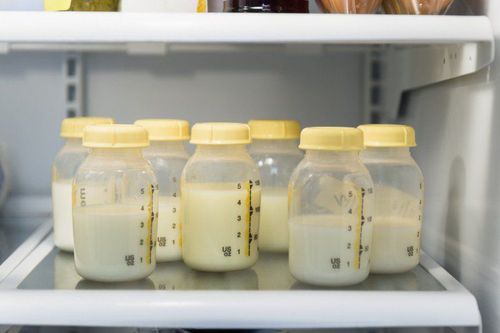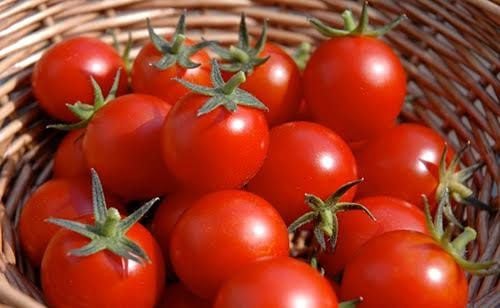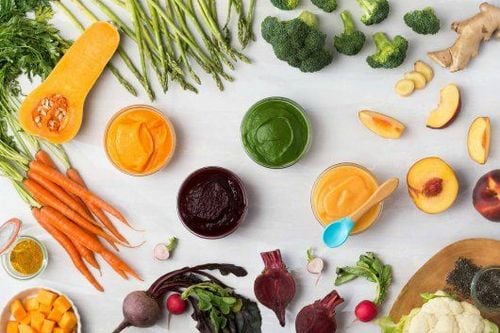1. Growth indicators in 9-month-old children
Before learning what a 9-month-old child can eat, the first thing parents need to do is learn and evaluate the child's weight and height indexes to see if the baby is up to the standard or not.
According to the World Health Organization (WHO), the weight and height parameters of 9-month-old boys are classified according to the following levels:
- Average weight of boys: 8.9kg
- The baby is impaired nutrition when the baby weighs less than 7.2kg. In particular, children weighing 7.9kg or less are classified as high-risk groups for malnutrition.
- The risk of obesity increased when a 9-month-old boy weighed 10 kg or more and was considered obese when his weight exceeded 10.9 kg.
- The average height of a baby this age is about 72cm.
Indicators of a 9-month-old girl according to WHO standards:
- Average weight is 8.2kg
- Malnutrition: baby weighs less than 6.6 kg. Similar to boys, 9-month-old girls are at risk of malnutrition when they weigh less than 7.3kg.
- The risk of obesity in a 9-month-old girl is 9.3kg and she is considered obese when she weighs 10.4kg or more.
- The average height of a 9-month-old girl is about 70.1cm.

2. What can 9-month-old babies eat?
2.1. Nutritional needs for 9-month-old babies
Before learning what 9-month-old babies can eat, parents need to understand the nutritional needs of 9-month-old babies. 9 months old is a relatively important period in terms of height and weight development, so parents need to learn about the necessary and adequate nutritional needs for their baby.
What 9 months old baby eats, besides breast milk, parents need to provide them with complementary meals such as powdered, condensed porridge, fruit, yogurt... Then, the 9-month-old baby's meals should divided into 3 main meals and 3 snacks, including:
- Breast milk: Try to maintain the habit of breastfeeding about 500 - 600ml per day.
- Three main meals: You can feed your baby with flour, porridge or pasty rice and are made from basic ingredients such as rice, meat, fish, cooking oil, green vegetables, and fruits. The ratio of ingredients should include about 60 - 90g of white rice, 60 - 90g of meat (or shrimp, fish), 15g of fat, green vegetables, ripe fruits...
- Three snacks include foods such as fruit, yogurt, cheese, biscuits...
2.2. What does a 9-month-old baby eat every day to develop a standard weight and height?
What can a 9-month-old child eat is a concern of many parents. To help children develop comprehensively in terms of height, weight and intelligence, the menu of weaning meals for babies needs to ensure that they provide enough 4 basic groups of substances: carbohydrates, proteins, fats, and vitamins and minerals. . Which may include the following foods:
- The group that provides starch includes: rice, oats, wheat and legumes...
- The group that provides protein includes meat, fish, shrimp, crab, egg yolk...
- The group that provides fats includes animal fats and vegetable oils
- The group that provides vitamins and minerals includes all vegetables and fruits.
In particular, parents should give priority to choosing dark green vegetables and citrus fruits. Some suggested foods for mom are: pureed fruit and vegetables, shredded steamed vegetables, quilted fruit (banana, avocado, mango), soft cooked pasta, scrambled eggs, shredded chicken, yogurt, porridge from oatmeal...
2.3. How many calories does a 9-month-old baby need?
Children from 8 to 12 months old need an average of 750-900 calories of energy per day to maintain activities and body development.
In breastfed babies, about 400 to 500 calories need is provided from breast milk, equivalent to about 720ml of breast milk per day.
Therefore, adding solid foods to provide energy for children is extremely necessary, especially more important in children who are weaned from breast milk too soon.

3. Things to keep in mind when feeding a 9-month-old baby with solid food
What a 9-month-old baby can eat depends on another important factor that is teething, usually by this time the baby has 4 incisors and begins to practice chewing food. Therefore, parents can completely let their children practice eating whole grain porridge, powdered cereal or minced vegetables instead of having to puree or crush like the previous stage.
Parents should create conditions for children to directly grasp foods such as vegetable sticks or pieces of fruit each time they eat. This habit both helps children freely explore the taste of food while encouraging them to practice chewing and stimulating digestive system function. Since then, children feel more excited about weaning meals, eat delicious food and develop a more comprehensive body.
9-month-old babies need to eat a variety of foods, in addition to breastfeeding, parents should add dairy products to their children's snacks such as yogurt, cheese, butter... Nutritional support for 9-month-old babies. Parents should build a rich menu for their children but still ensure to provide enough nutrients to help children eat well.
For breastfed babies, parents need to increase iron supplements in their baby's menu such as: chicken liver, pork liver, red meat... However, 9-month-old babies are still not ready to absorb all kinds of foods. foods such as: fresh milk, egg whites, seafood with hard shells .. because there is a high risk of causing allergies.
9-month-old babies can drink more water: Unlike the first 6 months of life, 9-month-old babies need to be replenished with enough water to avoid constipation in children.
It is advisable to get in the habit of letting children sit at the table when it is time to eat, this will train them to have a serious eating habit, helping them to feel more excited every time they eat.
When the child is 9 months old, parents should limit the use of a pacifier if the baby has a habit of using this item. As your baby starts to get more teeth, pacifiers can interfere with the development of teeth, so weaning off pacifiers will help your baby to get better teething.
In addition, parents should also pay special attention that 9-month-old babies need to supplement with necessary micronutrients: biological zinc, selenium, chromium, vitamins B1 and B6, ginger, acerola fruit extract (vitamins). C),... to improve taste, eat well, reach the correct height and weight, and exceed standards, have a good immune system, enhance resistance to less sickness and less digestive problems. Parents can refer to the supplement of micronutrients from pediatricians, nutritionists to use it for the right purpose and bring high efficiency.













